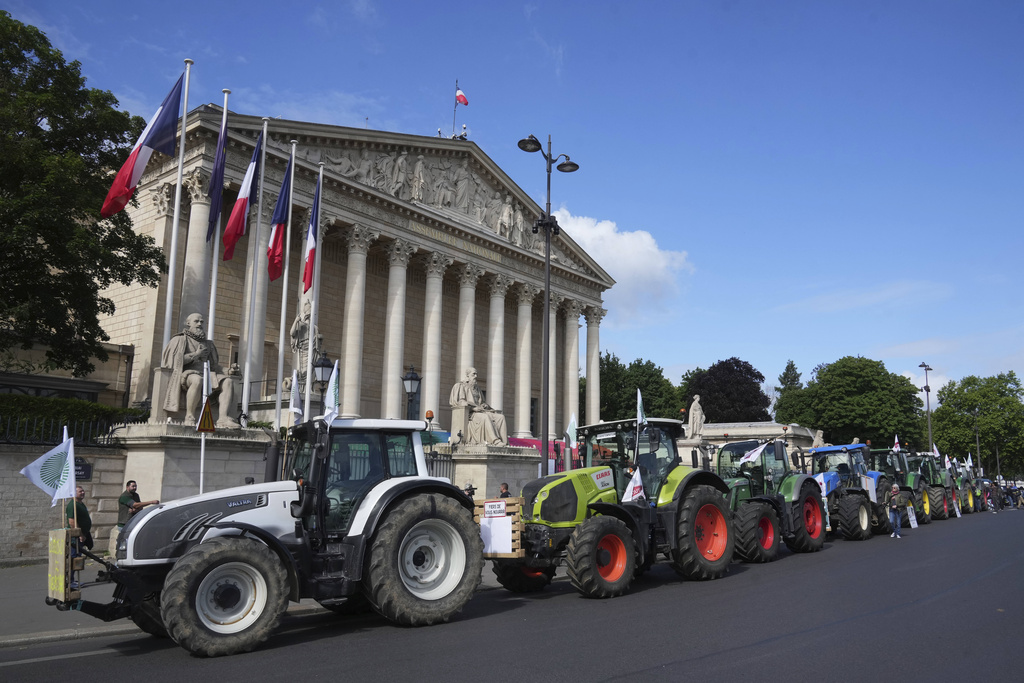EU farmer protests are far from over as they battle threats from Mercosur trade agreement and Ukraine
"If you do not fight for yourselves, no one will do it for you!" says one Polish farmerFarmers in Spain and France were again protesting agricultural imports from Ukraine and South America under the Mercosur trade agreement ahead of Brazilian President Luiz Inacio Lula da Silva visiting France and the expiration of a free trade agreement with Ukraine, writes TopAgrar.pl.
Da Silva wants to convince President Emmanuel Macron to drop his opposition to the EU-Mercosur Agreement, and at a press conference with the French head of state, told press that he would not “leave the Mercosur presidency without having concluded the trade deal,” a position he will be taking up in a few weeks.
Meanwhile, the French Federation of Agricultural Unions (FNSEA) has once again called on Macron to take action to create a minority in the EU to block the ratification of the Mercosur Agreement by the Council of the European Union.
In a statement quoted by Reuters, the French organization warned that the agreement will be “devastating for the beef, poultry and sugar industries and compromise the EU’s ambitions in terms of food sovereignty.”
“We are raising the alarm!” said Alain Carre, head of the French sugar industry group AIBS.
If an agreement with Mercosur is reached, the French are demanding clear trade rules: “Our demands (for an EU-Mercosur deal) are simple: reciprocity of regulations, traceability of products abroad and much clearer labeling,” said Jean-Michel Schaeffer, head of French poultry industry group Anvol.
In Spain, hundreds of farmers gathered in Madrid to protest excessive grain imports from Ukraine, which have resulted in grain prices below production costs.
“Spanish farmers will lose €1 billion this year,” Javier Fatas, leader of the farmers’ union COAG from the Aragon region in northeastern Spain, said.
Spaniards also refuse to import genetically modified grain from Mercosur, which is cheaper than Spanish grain, into the EU.
Similar sentiments are prevalent in Poland. In June, farmers took to the streets again to express opposition to trade liberalization with Ukraine, the Mercosur agreement, and the Green Deal, reminds TopAgrar.
“Our position should be firm and clear: the customs and limits from before the war must return. Otherwise, we will not be able to compete on the European market, and especially in Poland,” said Stanisław Barna from the grassroots All-Poland Farmers’ Protest.
At the protest in Krążkowy in Wielkopolska, another OOPR representative, Krzysztof Olejnik, called the provisions of the EU-Mercosur Agreement a “spit in the face” of farmers: “If we are talking about Mercosur, we still do not have detailed information about the terms of this agreement. We assume that the terms of this agreement will probably not be favorable for us,” said Krzysztof Olejnik.
The lack of hope for economic improvement in agriculture is combined with a sense of lack of action on the part of the Ministry of Agriculture, the Government and the European Commission. Maciej Zawadzki from the Association of Farmers of Southern Wielkopolska said, “We decided to take to the streets because our issues that were supposed to be resolved are still unresolved. The government remains passive. (…) Unfortunately, we do not see any actions that would improve our position and situation. Quite the opposite: what is happening is working to our disadvantage.”
Stanisław Barna says the only option for farmers now is to put pressure on decision-makers via protests.
“We want to work with dignity, have a stable situation. Have a decent salary for our work (…) This is what we are reduced to, to make our farms fail. If you do not fight for yourselves, no one will do it for you! Thank you and God bless you for your determination and showing strength today. Let the government see, and Minister Siekierski will finally get down to work, because he has been talking to us for a year and a half, saying that he will prepare a position, but let him finally come to West Pomerania and talk,” he said.
Farmers also hope the newly elected president, Karol Nawrocki, will come through for them. “Mr. President, we are here, we are watching, we are waiting for your decision,” Barna added. “We farmers would like these promises to be fulfilled and not forgotten.”
Macron and Lula did not appear to make much headway on EU-Mercosur trade deal. Macron clearly wants to boost trade and relations with Brazil but he also made clear that he cannot accept the deal in its current form, emphasizing the need for “either mirror clauses or safeguard measures” to ensure Brazilian products conform with EU production standards.
Source: Remix






